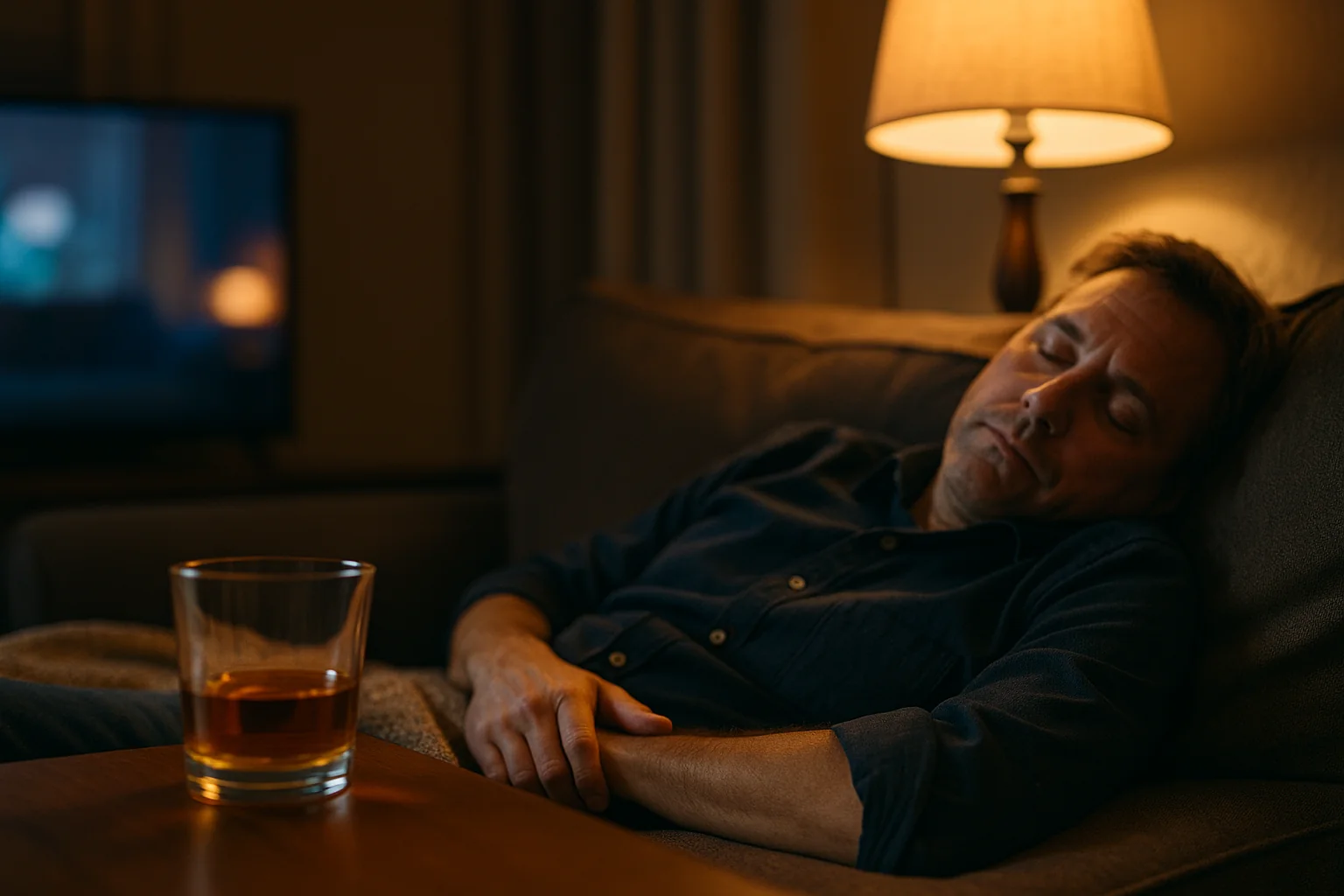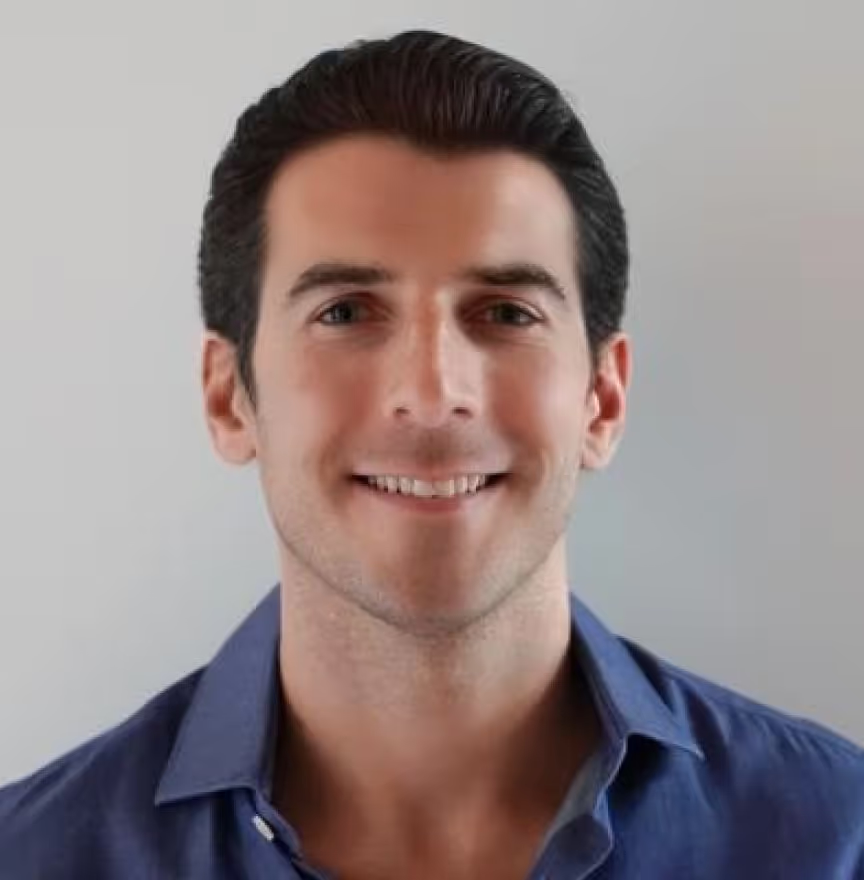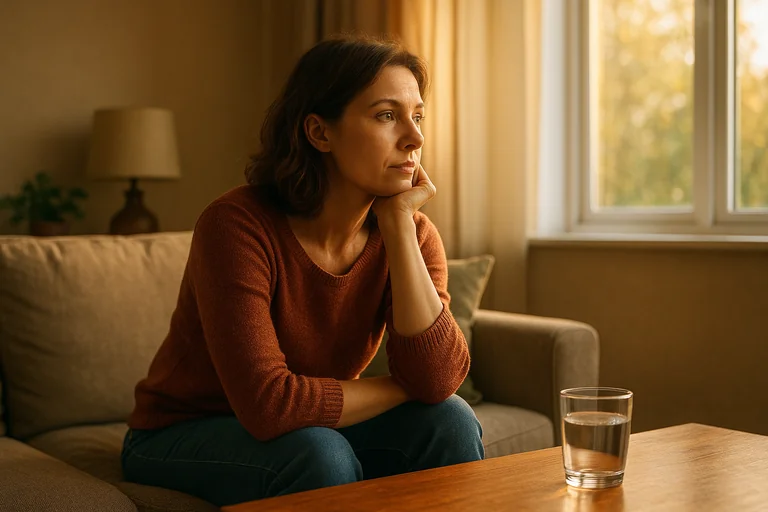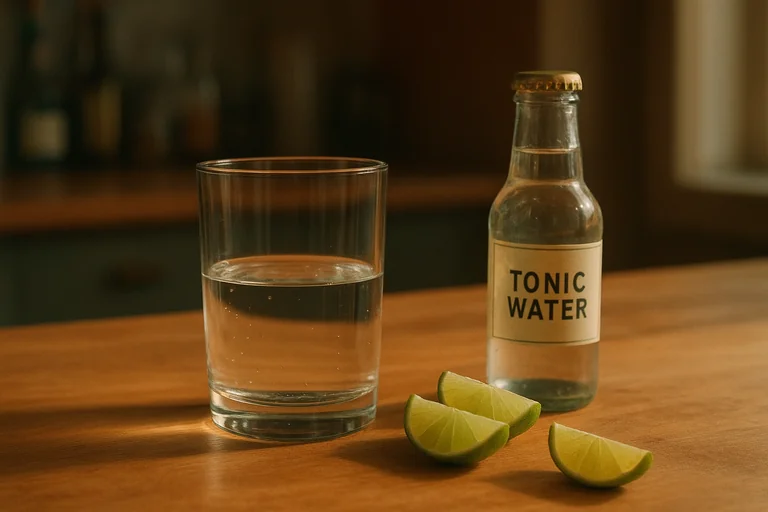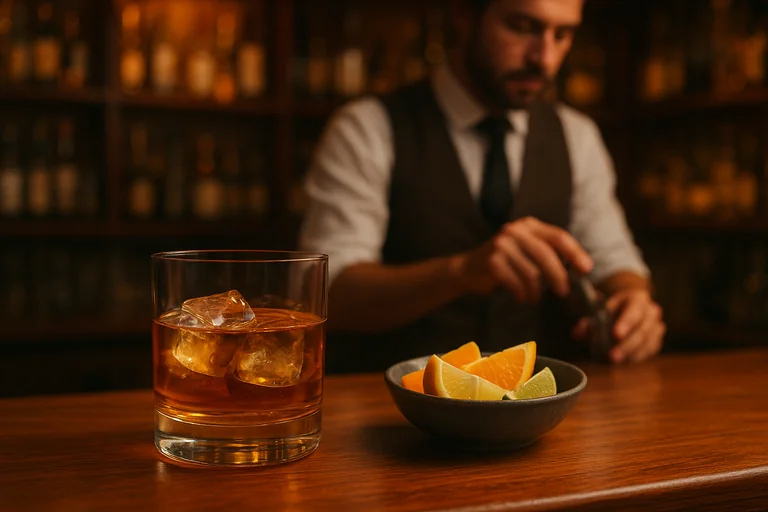A 2 minute assessment to get a personalized mental health or alcohol recovery plan.
Alcohol is a central nervous system depressant that boosts sleep pressure by raising brain adenosine, dampens wake-promoting circuits, and enhances inhibitory GABA signaling to make you drowsy, but this sleepiness produces disrupted, non-restorative sleep with first-half REM suppression followed by second-half REM rebound and fragmentation.
What You'll Discover:
- How alcohol spikes adenosine and GABA to trigger drowsiness
- Why early sedation trades off for second-half REM rebound and awakenings
- The link between alcohol, airway relaxation, and 25 percent higher OSA risk
- How evening drinking blunts melatonin and shifts your circadian clock
- Why tolerance develops rapidly and creates an insomnia trap
- Evidence-based strategies to protect sleep without alcohol
Alcohol is a central nervous system depressant. It boosts sleep pressure by raising brain adenosine, dampens wake-promoting circuits, and enhances inhibitory GABA signaling, so you feel drowsy. But this "sleepiness" is not restorative sleep. In the first half of the night, alcohol can reduce sleep latency and increase deep (slow-wave) sleep while suppressing REM; in the second half, as alcohol is metabolized, REM rebounds and sleep becomes fragmented with more awakenings and vivid dreams.
Alcohol relaxes upper-airway muscles and worsens snoring; higher intake raises obstructive sleep apnea (OSA) risk about 25 percent and can worsen oxygen drops in people already at risk.
All that said, evening drinking can blunt melatonin and nudge your circadian clock, adding jet-lag-like effects to the fragmentation. Tolerance to alcohol's sedating effects develops rapidly, within a few nights, so you may need more for the same "knockout," which worsens sleep quality and daytime sleepiness.
With that in mind, here's exactly why alcohol makes you sleepy, what happens to your sleep architecture throughout the night, and how to protect rest without the nightcap.
The quick science of why alcohol makes you sleepy
It spikes adenosine, your brain's sleep pressure signal - Adenosine builds up while you're awake and helps switch the brain toward sleep at night. Alcohol elevates extracellular adenosine by interfering with its reuptake (via ENT1 transporters), which temporarily boosts sleepiness and shortens the time it takes to fall asleep. That's why a nightcap can feel like a "shortcut" to lights-out. The price: the adenosine spike is mis-timed and short-lived, setting you up for rebound wakefulness later.
It leans on inhibitory neurotransmission - Alcohol potentiates GABAergic signaling and dampens excitatory glutamate (including at NMDA receptors). In moderate-to-higher doses, this slows cortical networks, adding to sedation. But sedation does not equal healthy sleep architecture; as your body clears alcohol, excitatory systems surge and sleep destabilizes.
It relaxes your airway and alters physiology - Alcohol relaxes pharyngeal muscles, narrows the airway, and reduces arousal responses, so snoring worsens and breathing interruptions (apneas/hypopneas) are more likely. Meta-analyses link higher alcohol intake to about 25 percent increased risk of OSA; in people who already have OSA (diagnosed or undiagnosed), drinking can drop oxygen lower and fragment sleep further.
It nudges the body clock - Evening alcohol can suppress melatonin secretion and tug at circadian signals for core body temperature and cortisol. The result is a mini social jet lag layered on top of sleep fragmentation, especially if you also go to bed later or sleep in after drinking.
What alcohol actually does to a night of sleep (timeline)
0 to 1 hours after your last drink - You fall asleep faster than usual (shortened sleep latency). Adenosine and GABAergic effects are high; you feel pleasantly drowsy. REM sleep is suppressed early in the night.
First half of the night - You may log a bit more slow-wave sleep (SWS) than on alcohol-free nights, but it's a trade: REM stays low. Upper-airway relaxation boosts snoring; if you're vulnerable to OSA, apneas may increase.
Second half of the night (as blood alcohol falls) - Alcohol is metabolized at roughly 0.015 percent BAC per hour on average; as levels drop, the brain rebounds. Expect more awakenings, lighter sleep, higher heart rate, and vivid dreams as REM rebounds. If you went to bed late or dehydrated, sleep becomes choppy; bathroom trips and dry-mouth awakenings multiply.
Morning after - Fatigue, brain fog, sleep inertia, anxiety/irritability ("hangxiety"), and impaired performance, even if total time in bed looked adequate. NIAAA lists fatigue and sleep disturbance as hallmark hangover symptoms.
Key point: Alcohol front-loads sedation and back-loads disruption. It can feel like it "helps sleep," but it trades early drowsiness for poorer quality and continuity overall.
Why you get sleepy after a drink but then sleep worse
Mis-timed adenosine: The early spike flips on sleepiness too early relative to your internal clock, and when adenosine drops back, you wake. REM suppression followed by rebound: Suppressing REM in the first cycles builds pressure for REM rebound later, more dreams, awakenings, and lighter sleep. Airway instability: Relaxed airway muscles and reduced arousal responses increase snoring and apneas, jarring you out of deeper sleep stages. Circadian "static": Blunted melatonin plus later bedtime plus oversleeping next morning equals a mini phase shift, which can perpetuate the cycle the next night.
Tolerance, rebound, and the insomnia trap
Alcohol's sedative tolerance develops quickly, after just a few consecutive nights of use, your brain adapts, and the early drowsiness fades. Many people start increasing dose or drinking earlier, which deepens sleep fragmentation and daytime sleepiness. Classic reviews show that alcohol interacts with sleep restriction to exacerbate next-day sleepiness and performance problems, so you feel you "need" the nightcap even more. That's the insomnia trap.
It knocks me out - so why do I wake at 3 a.m.
Two reasons dominate. Metabolic arousal: As BAC falls about 0.015 percent per hour, sympathetic tone rises and REM rebounds, pushing you into lighter stages with more awakenings. Respiratory instability: Alcohol narrows the upper airway; if you snore or have undiagnosed OSA, you'll experience more breathing events in the early morning hours when muscle tone dips, cue 3 a.m. wake-ups.
Snoring, sleep apnea, and alcohol
A robust evidence base shows that alcohol worsens snoring and is associated with a higher risk of OSA; in those already diagnosed, it increases event severity and lowers oxygen saturation. That's because alcohol both relaxes airway muscles and blunts arousal thresholds, so the brain responds slower to blocked breaths. Result: louder snoring, more apneas, and more fragmented sleep. Reducing or avoiding alcohol, especially within 3 to 4 hours of bedtime, is a standard OSA sleep-hygiene recommendation.
Does type or amount matter for sleepiness
Dose matters most. Higher doses produce more sedation upfront and more disruption later. Even moderate doses impair architecture. Timing matters. Earlier, smaller drinks cause less fragmentation than late, heavier ones. Type matters less than ethanol. Beer, wine, spirits, ethanol drives the physiology; mixers and congeners may tweak hangover symptoms but don't rescue architecture.
The role of melatonin and circadian timing
A controlled human study found that an evening alcohol dose reduced salivary melatonin by about 15 to 19 percent several hours after ingestion. Lower melatonin can delay sleep timing and degrade sleep consolidation. While not every study shows melatonin changes (there is some inconsistency), the overall circadian picture supports dose-dependent perturbations of melatonin/cortisol rhythms and core temperature after alcohol, especially in the evening.
Daytime sleepiness and hangxiety - why you feel wrecked
After an alcohol-fragmented night, you get less REM consolidation, more micro-awakenings, and a rollercoaster of sympathetic (stress) activity, classic drivers of fatigue, brain fog, and mood dips. NIAAA's hangover guidance lists fatigue and sleep disturbance among typical symptoms. Alcohol plus sleep restriction multiplies next-day impairments, which is why "just one bad night" after drinks can tank your productivity.
Alcohol helps me sleep - what should I do instead
If you're using alcohol as a sleep aid, you're treating a short-term symptom while worsening long-term sleep. Consider this layered plan, adapted from sleep and addiction science.
Reshape the evening window - Cut-off time: Stop alcohol at least 3 to 4 hours before bed to reduce REM suppression and 3 a.m. wake-ups. The later and heavier you drink, the worse the second half of the night. Hydrate and balance: Alternate with water; pair any drink with protein plus fiber to blunt glucose swings that can jolt you awake.
Protect sleep pressure the natural way - Light and timing: Morning bright light and a consistent wake time build strong sleep pressure by night. Activity: Daytime movement (especially outdoors) deepens the homeostatic drive, without the adenosine "fake-out" alcohol creates.
Build a wind-down that actually works - CBT-I (cognitive behavioral therapy for insomnia) principles, consistent bed/wake times, stimulus control, and a 30 to 45-minute wind-down (dim light, low arousal) beat nightcaps long-term. Substitutes: hot shower, breathing drills, light reading, herbal tea ritual, gentle stretching, or a brief journaling session to offload mental chatter.
Screen for sleep apnea if you snore or wake unrefreshed - Snoring, witnessed apneas, or morning headaches? Alcohol may be magnifying an underlying OSA. Talk with your clinician about home sleep testing; treating OSA (with CPAP/oral appliance) improves sleep quality and reduces alcohol's breathing effects.
If cutting back is hard, get structured help - If small reductions don't stick, ask about behavioral counseling for alcohol. For many adults who are medically appropriate, naltrexone oral tablets, taken alongside counseling, can reduce heavy-drinking days and craving, which often makes sleep improvements easier to sustain. Clinicians screen for contraindications (current opioid use/dependence, acute hepatitis/liver failure) and may check liver function.
Safety note: If you've been drinking heavily for a while, don't stop abruptly without medical advice; alcohol withdrawal can be dangerous and sometimes requires assisted withdrawal before longer-term sleep and recovery work begins.
Frequently asked questions
Is a small nightcap really that bad? - Even modest doses alter architecture (early REM suppression, later REM rebound and awakenings). If you're sensitive to sleep loss or snore, the trade-off often isn't worth it. If you do drink, finish 3 to 4 hours before bed and keep it light.
Why am I sleepy in the afternoon after drinking the night before? - Fragmented sleep and reduced REM burden you with sleep debt, and residual circadian drift compounds afternoon slump. Alcohol also interacts with prior sleep restriction to magnify daytime sleepiness and performance hits.
Can I metabolize it off before bed? - On average, BAC falls by about 0.015 percent per hour after it peaks. That means a few strong drinks in the evening won't be fully cleared by bedtime. Planning earlier, lighter intake, or skipping, works better.
Is wine better than whiskey for sleep? - Not really. Ethanol drives the sleep effects across beverages. Congeners can tweak hangover symptoms, but architecture disruption tracks dose and timing, not label.
Why do I wake up anxious after drinking? - As alcohol leaves your system, the brain rebounds toward excitation; coupled with REM rebound and poor sleep, anxiety spikes ("hangxiety"). Hydration, earlier cut-offs, and limiting dose help; if this is frequent, consider cutting back or talking with a clinician.
Does alcohol cause chronic insomnia? - Long-term heavy use is linked to persistent insomnia symptoms and circadian disruption; many people develop a nightcap habit that backfires. Treating the alcohol pattern and using CBT-I principles improves odds of stable sleep.
I have sleep apnea - can I drink sometimes? - Ask your clinician. Many people with OSA are advised to avoid alcohol near bedtime because it worsens airway collapse and oxygen drops, even on treatment. If you choose to drink, keep it light and early, and stick to your therapy (CPAP).
Practical playbook - better sleep without the nightcap
Move the drink earlier (happy hour, not nightcap). Aim for no alcohol within 3 to 4 hours of lights out. Cap the dose (1 standard drink equals 14 g ethanol; two max on social nights). Know that the body clears about 0.015 percent BAC per hour after peak. Hydrate and pace (1 drink or less per hour; alternate with water). Eat first (protein plus fiber) to reduce glycemic swings and late-night wakeups.
Do a real wind-down: dim lights, 30 to 45 minutes of quiet routine; keep the bed for sleep (and sex) only. Protect mornings: fixed wake time and bright light strengthen nighttime sleep pressure without alcohol's rebound. Check for OSA if you snore, wake unrefreshed, or have hypertension. Alcohol may be unmasking a treatable sleep disorder.
Get structured help if reductions don't stick. Counseling plus naltrexone oral tablets (for eligible adults) can curb heavy days and craving, often the fastest route to better sleep.
Ready to understand where you stand?
Wondering whether your "sleepy after a drink" habit is actually wrecking your nights? Our quick, confidential alcohol assessment gives you a private, research-based readout you can share with your clinician, plus personalized guidance on safer next steps.
Start your 3-minute alcohol use assessment
